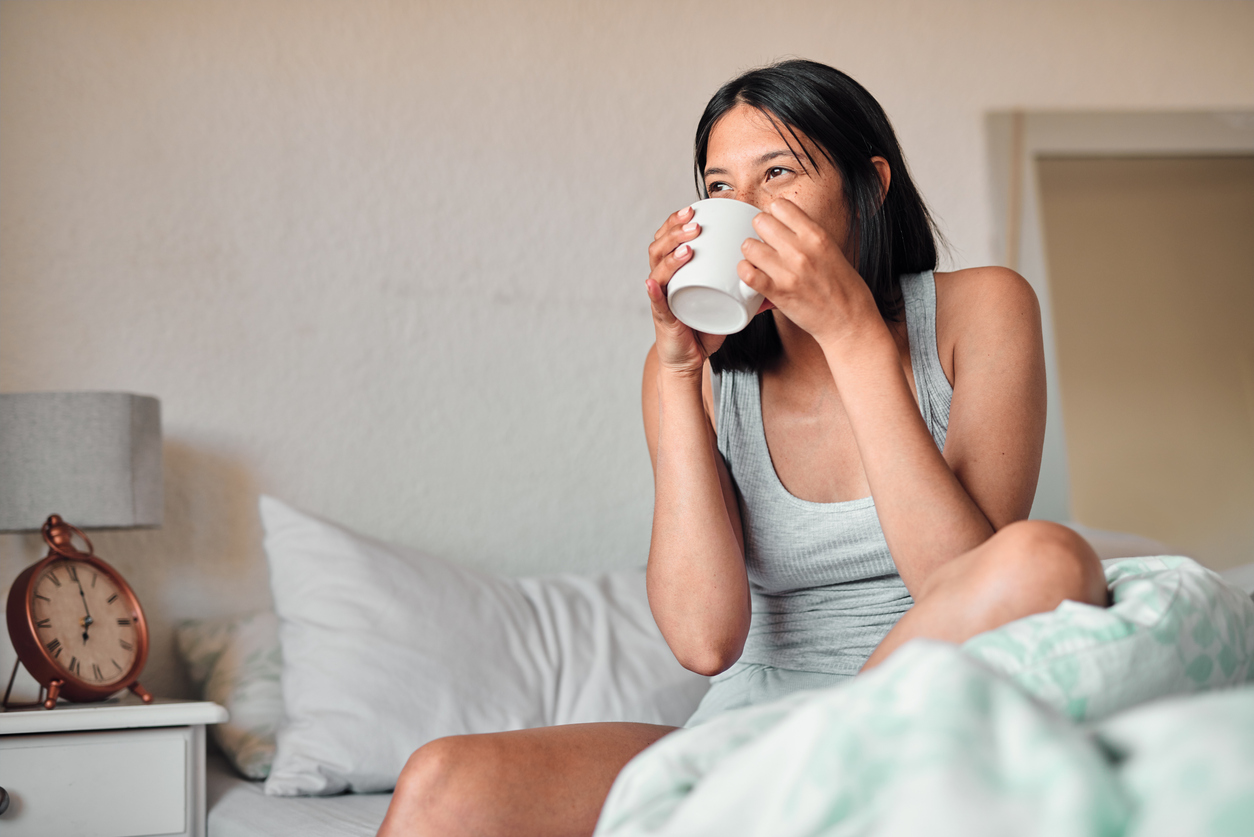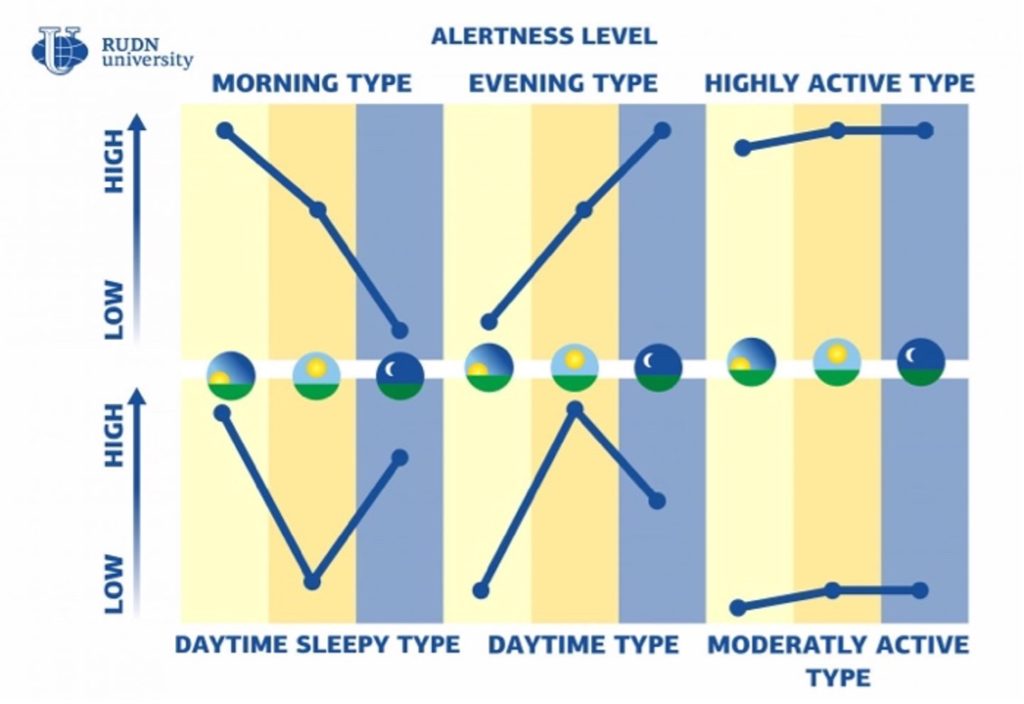How to Start Waking Up Early: Tips & Benefits

You’ve probably heard the saying “the early bird catches the worm,” or the idiom “be up with the lark.” In other words, there may be some benefits to waking up at the crack of dawn. But what about those of us that, unlike morning larks, prefer to wake up later and go to sleep later – the night owls? This tendency and preference to optimally function at a certain time of the day is known as a chronotype. Although you may have only heard of morning larks and night owls, there may actually be more than 2 chronotypes. In fact, Russian researchers from RUDN University claim to have identified up to 6 different chronotypes. In addition to morning and evening types, they identified highly active types, moderately active types, daytime sleepy types, and daytime types.

Image credit: https://www.eurekalert.org/multimedia/pub/249995.php
The Notorious 4 AM Risers – Defying Genes?
A number of CEOs and people in positions of power have even touted the benefits of “extreme” early types – the famous 4 AM risers, as it were. For example, Apple CEO Tim Cook claims to rise before 4 AM, Fiat Chrysler CEO Sergio Marchionne wakes at 3:30 AM, and former President Donald Trump once claimed to be up by 5 am while only sleeping 4-5 hours. Even Benjamin Franklin once said, “Early to bed and early to rise, makes a man healthy, wealthy, and wise.” With so many people in positions of power hyping the supposed benefits of extreme early rising, you may forget that most people are not in fact biologically primed to wake up so early. In fact, your chronotype is heavily influenced by your genetic predisposition.
A study by genetics company 23andMe published in the journal Nature Communications identified 15 genetic variants that increased a person’s chance of being a morning person by between 5 and 25 percent. Age and gender significantly influenced the likelihood of being a morning lark; 48 percent of women were more likely to be early risers compared to just 39 percent of men. Older adults were also more likely to be early risers; 63 percent of people over the age of 60 were more likely to be early risers, compared to just 24 percent of people under the age of 30.
How Rare Are Early Risers?
Another study published in the journal SLEEP found that the prevalence of advanced sleep phase disorder – characterized by a sleep schedule that is significantly earlier than societal norms – is conservatively found in less than 1 percent of people (specifically 1 in every 300 patients, according to the study). It’s important to remember that those with advanced sleep phase disorder are still likely to get the recommended amount of sleep per night and begin sleeping from between 6 PM to 9 PM, and wake up between 2 AM to 5 AM. The famous “4 am risers” are, statistically, highly unlikely to be one of the 0.3% of people who advanced sleep phase. Their early wake time may therefore be limiting their ability to get the recommended minimum of 7 hours of sleep per night.
Should I Wake Up Extremely Early?
Most people have “intermediate” chronotypes – they tend to function optimally when they don’t fall asleep too late or wake up too early. If you’re thinking about blindly waking up at 5 AM to be productive, think otherwise. Although the typical 9-5 workday may favor early birds, lean into your natural chronotype and seek flexible work arrangements that help you get the most out of your day. For example, if you consider yourself a night owl and think you’re most productive when allowed to sleep in and work late, be sure to check out the advocacy groups such as B-Society that are fighting for chronotype equality. According to B-Society, their mission is “to increase quality of life and productivity of late risers by creating later starting times in schools and workplaces.”
For many of us, waking up 4 AM may be miserable. Every major organ in the body has its own circadian rhythm, and forcing a shift by 2 or more hours may severely impact their functioning and even causing a kind of perpetual jet lag. Couple this shift with a reduction in total sleep time that may come from enforcing an unnatural wake time, and you may find yourself in a living nightmare! For others, waking up early gives you a head start to your day and allows you to function at your peak performance. Remember that the best time to wake up and go to bed depends on your own individual chronotype, your age, gender, and even your personal preference.
Tips for Waking Up Early
No matter your chronotype, you can support your sleep-wake patterns by following sleep hygiene tips (check out 10 sleep hygiene tips here). If you’re still fixed on waking up earlier than usual, set realistic expectations and start by gradually changing your bedtime and wake-up time. For example, if you’re used to waking up at 8 AM, start by setting the alarm 15 minutes earlier than usual for 7:45 AM. You can continue to shift your bedtime, too. Once you get acclimated, you can continue to push your alarm clock forward by another 15 minutes until you reach your desired wake-up time. But, if you feel a major dip in productivity or mood during the day, listen to your chronotype, and don’t be afraid to revert back to your original schedule!
SleepScore Labs Solutions
Download the free SleepScore App for insights and articles on how well you sleep, the quality and quantity of your sleep cycles, and sleep improvement progress with science-backed tips and insights. Download it for free from App Store and Google Play Store!
You can also visit the SleepScore Store for a wide range of sleep-promoting products carefully curated by SleepScore Labs’ team of researchers including temperature cooling pillows, thermoregulating pajamas, metabolic cooling, gravity blankets, and more to support your sleep-wake schedule!
Sleep well!